Healing 6 Gratitude
Kevin Ireland
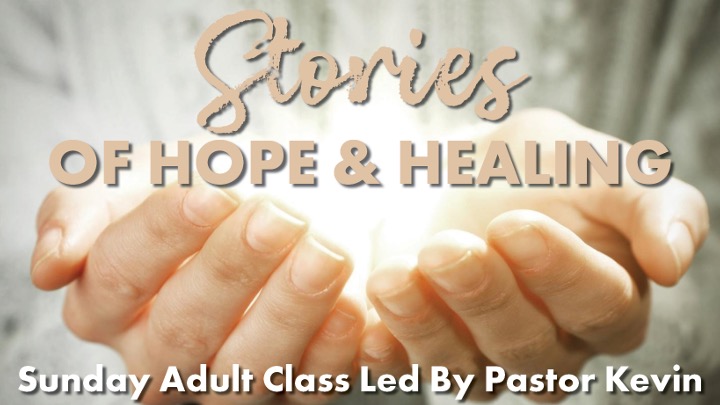
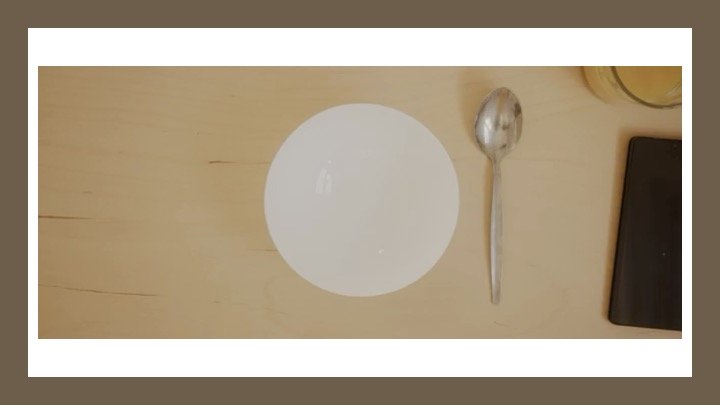
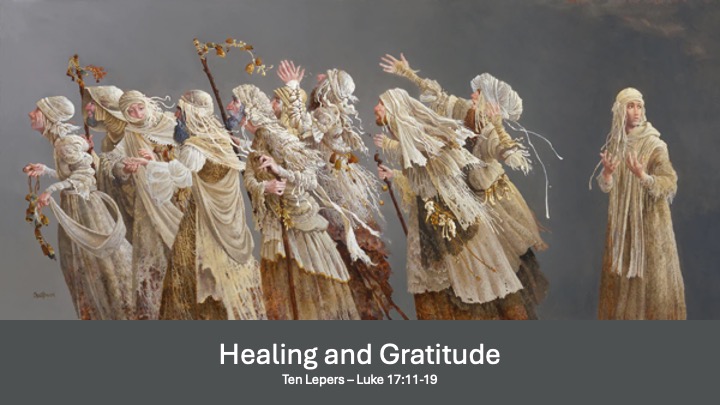
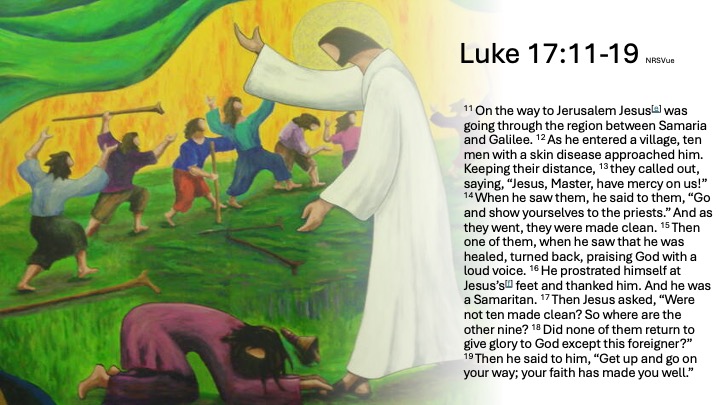
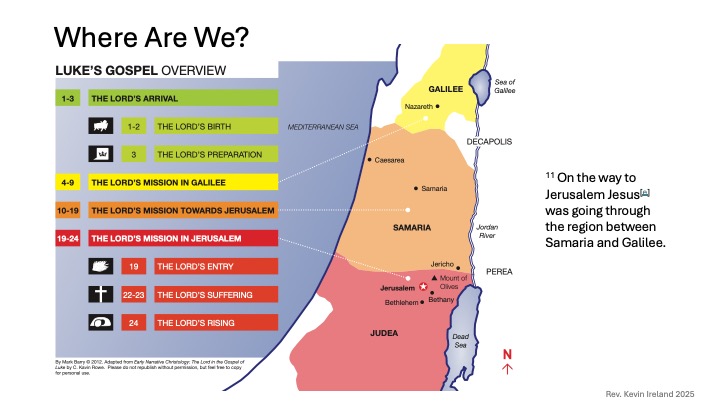
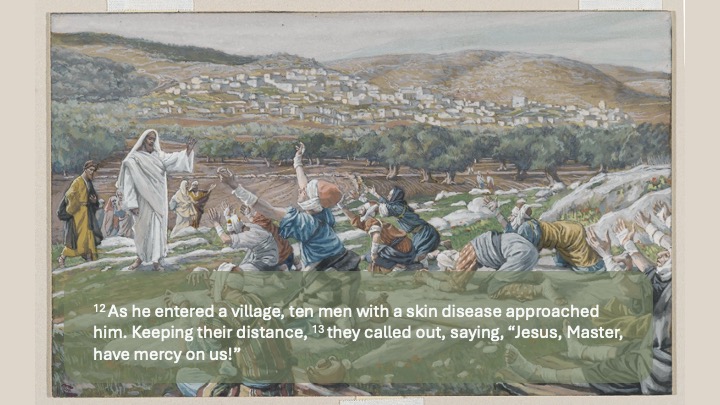
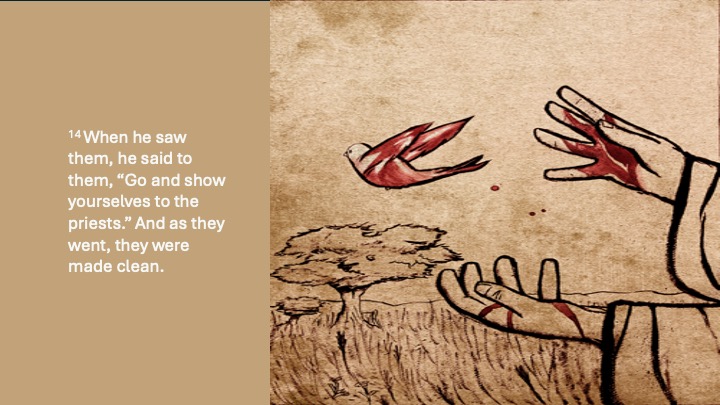
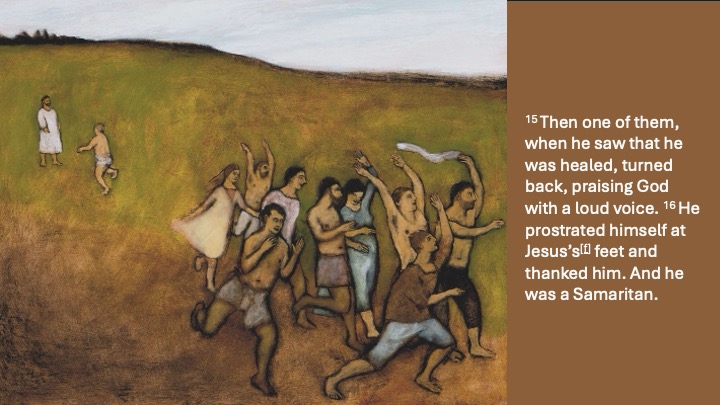
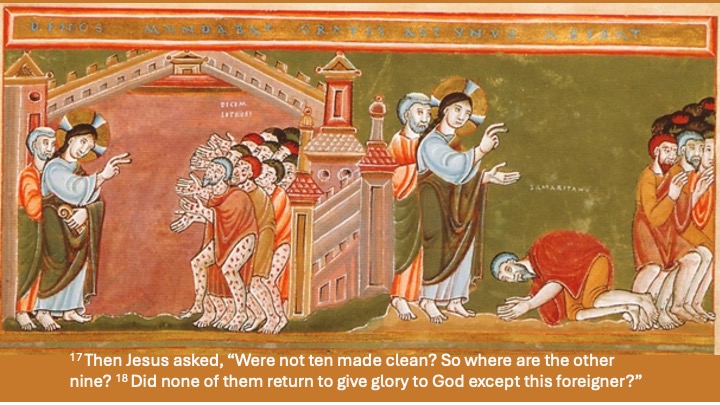
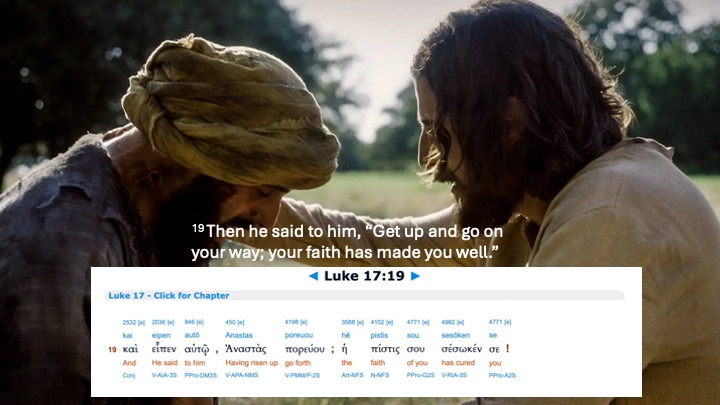

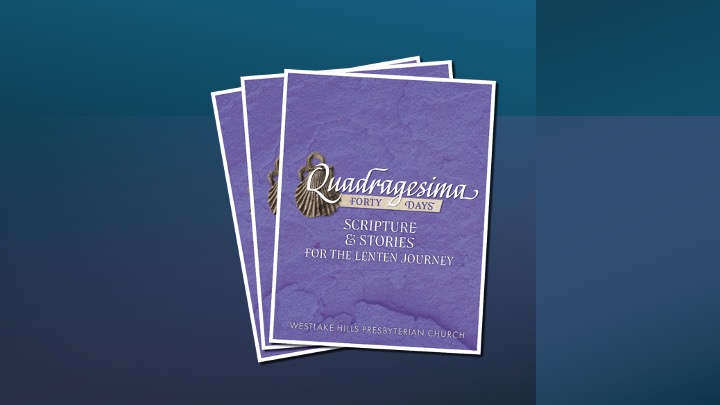

Healing 6 Gratitude
Links
< Home Page > < Hope & Healing Menu >
Healing Week 6 Text
Series review:
- Trust – Naaman
- Persistence (Emily)- Hemorrhaging Woman – Mark 5:25-34
- Barriers to healing (Chris) – Pool of Bethseda – John 5:1-15
- Boldness - Bartimaeus – Mark 10:46-52
- Process (Stacy) - Jesus healing the blind man in Mark – Mark 8:22
Guess what we’re going to talk about today? - video
Story of acting out in Sunday School
Questions
• How do you remember the story?
• Do you remember any sermons about the story?
Painting by James Christensen
11 On the way to Jerusalem Jesus[e] was going through the region between Samaria and Galilee. 12 As he entered a village, ten men with a skin disease approached him. Keeping their distance, 13 they called out, saying, “Jesus, Master, have mercy on us!” 14 When he saw them, he said to them, “Go and show yourselves to the priests.” And as they went, they were made clean. 15 Then one of them, when he saw that he was healed, turned back, praising God with a loud voice. 16 He prostrated himself at Jesus’s[f] feet and thanked him. And he was a Samaritan. 17 Then Jesus asked, “Were not ten made clean? So where are the other nine? 18 Did none of them return to give glory to God except this foreigner?” 19 Then he said to him, “Get up and go on your way; your faith has made you well.”
Question
Does anything jump out at you with this reading?
Only in Luke – right in the middle – crossing borders
• Jesus trending (Luke 9:1017) – transfiguration – passion prediction
• Journey to Jerusalem (not allowed in Samaritan village, sending disciples 70)
• Good Samaritan (Luke 10:25-37)
• Visit to Mary and Martha (Luke 10:38-11:36)
• Teaching about discipleship (Luke 14:1-35)
• Parables of the Lost (Luke 15:1-32)
• Parables about dishonest wealth (Luke 16:1-31)
• Teaching and Manifesting the Kingdom of god (Luke 17:1-18:30)
Chapter 17 – millstone, mustard seed, and slaves
Immediately follows “Who among you would say to your slave who has just come in from plowing or tending sheep in the field, ‘Come here at once and take your place at the table’? Would you not rather say to him, ‘Prepare supper for me, put on your apron and serve me while I eat and drink; later you may eat and drink’? Do you thank the slave for doing what was commanded So you also, when you have done all that you were ordered to do , say, ‘We are worthless slaves; we have done only what we ought to have done!” (Lk 17:7-11)
As he (Jesus) entered the village – in contrast to last week’s story – keep in mind how different these two stories are
17:12 – “keeping their distance”
suggesting Lev 13:45-6
45 “The person who has the defiling disease shall wear torn clothes and let the hair of his head be disheveled, and he shall cover his upper lip and cry out, ‘Unclean, unclean.’ 46 He shall remain unclean as long as he has the disease; he is unclean. He shall live alone; his dwelling shall be outside the camp.
Called out master – only time when this is not disciples
Notice that NRSVue doesn’t use the word leper – wide range of skin diseases (all unclean)
ἐπιστάτης (epistatēs) master \
(Noun Vocative Singular Masculine )
This word occurs about 7 x - always by disciples except here
Meaning
• primarily one who stands by;
• one who is set over;
• in NT in vocative, equivalent to διδάσκαλε, or ῥαββι, master, doctor, Lk. 5:5; 8:24, 45; 9:33, 49; 17:13*
James Tissot - The Healing of Ten Lepers (Guérison de dix lépreux) - Brooklyn Museum
17:14 – “show yourself to priests”
Lev. 13:2-3;
13 The Lord spoke to Moses and Aaron, saying:
2 “When a person has on the skin of his body a swelling[a] or an eruption or a spot and it turns into a defiling disease on the skin of his body, he shall be brought to Aaron the priest or to one of his sons the priests.
Lev. 14:2-32
14 The Lord spoke to Moses, saying, 2 “This shall be the rule for the person with a defiling skin disease at the time of his cleansing:
“He shall be brought to the priest; 3 the priest shall go out of the camp, and the priest shall make an examination. If the disease is healed in the defiled person, 4 the priest shall command that two living clean birds and cedarwood and crimson yarn and hyssop be brought for the one who is to be cleansed.
5 The priest shall command that one of the birds be slaughtered over fresh water in a clay vessel. 6 He shall take the living bird with the cedarwood and the crimson yarn and the hyssop and dip them and the living bird in the blood of the bird that was slaughtered over the fresh water. 7 He shall sprinkle it seven times upon the one who is to be cleansed of the defiling disease; then he shall pronounce him clean, and he shall let the living bird go into the open field.
Question
• When did they get healed?
• Imagine how that might have happened?
• All at once?
• What does it say about their faith - obedience
We don’t know how long?
Was he the first?
presumably heading to Jerusalem Temple but . . .
The unexpected turn that Luke loves to use (remember where we are)
The Samaritan would have gone to the priest on Mount Gerizim in Samaria; the other nine presumbably Jews, would go to Jerusalem
"Ten Lepers Healed" By Brian Kershisnik
ἀλλογενής (allogenēs) foreign (G0241)
(Adjective Nominative Singular Masculine )
Only time the word is used
Meaning
• of another race, or nation, i.e., not a Jew;
St. Luke mosaic, at All Hallows Church, Allerton, UK By Rodhullandemu
We may be misled, by the end of the passage, into thinking that only the Samaritan had faith. Yet all ten were people of faith, willing to expose themselves and risk everything by going to the priests, even unclean: obey, even when there are no visible reasons to. It was only on the road that they were cleansed of their disease. Their faith came first, before any signs of a cure.
πίστις (pistis)
faith, faithfulness, belief, trust, with an implication that actions based on that trust may follow; "the faith" often refers to the Christian system of belief and lifestyle
σῴζω (sōzō)
to save
to bring safely, restore to health
Translations:
(KJV) - 19 And he said unto him, Arise, go thy way: thy faith hath made thee whole.
(ESV) And he said to him, “Rise and go your way; afyour faith has agmade you well.” also NIV
(NLT) 19 And Jesus said to the man, “Stand up and go. Your faith has healed you
(Message) Then he said to him, “Get up. On your way. Your faith has healed and saved you.”
Question
is there a difference between being made clean and being saved/healed/made well . . .
Did something different happen to the Samaritan Leper? Why?
Short video about how gratitude is good for your health – hope it’s old news
Video about having gratitude even when things are not as we want